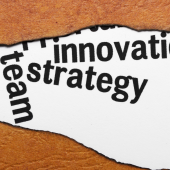Strong Corporate Culture Can Kill Recruiting
The recruiting and retention efforts of most organizations are not designed to attract and retain a diverse group of innovation personalities: analytical, methodical, creative, people-oriented. They are designed for one style only--the style that is consistent with an organization's overall personality. This can leave an organization unbalanced and unable to innovate at full capacity. If you then layer in leadership and cultural issues, you will see why it is so difficult to get the right people in the right roles.
The Leader May Drive Personality
Consider a Fortune 100 technology company that has been wildly successful for many years, but recently has struggled to grow. The longtime CEO, tested out as highly analytical. He is an incredibly bright individual who loves data. When I polled the leadership, it became clear to me that what they valued above all was a data-driven approach to business. In fact, the company loves data so much that, during lunch, I had one of the employees print off all of the measures used to monitor one aspect of the business. When the sheets of paper were spread out, they ran from one end of the room to the other. And this was a large room.
Although measures are useful, too much data can be detrimental to innovation. If you only focus on the numbers, sometimes you will miss big opportunities. It's a classic situation of not being able to see the forest for the trees. The leader was data-driven which cascaded to every top leader.
The Downside of a Strong Corporate Personality
A side effect of this particular culture is that it was known as a company "with no heart." If not managed properly, the individuals with a people-oriented personality would struggle in an environment like this. But it doesn't have to be this way. There are a number of methods that can be used to attract and retain talent, regardless of the company's personality. For example, given that hearts are often less motivated by hard numbers, using subjective feedback can help increase their level of engagement. Praise people on what they value, not on just what the company values.
All companies have a personality. And your organization's personality, or culture, is useful because it helps you move quickly as I point out in an earlier article. Members of the culture know what to expect, and they share core traits and values. The culture helps people work together well, because homogeneous teams are more efficient due to the relative lack of conflicting viewpoints and approaches. But in the process, cultures can exclude important styles and individuals. And this inhibits growth. So, knowing what your culture or personality is can be quite helpful.
How Industry Drives Personality
In some cases, as with the previous example, the leadership of an organization can define the culture. But more often, the organization's industry is an influential determinant of its overall personality. For example, marketing and branding companies may be more creative, while engineering companies may be more data-driven. Nonprofits might be people-oriented while a large manufacturing company might be results-oriented. But these generalizations do not always prove to be true.
One might think that a company's personality is the aggregate of the personality styles. As it turns out, this is not true. Assessing the personalities of all employees does not necessarily lead to an assessment of the company's personality. Some organizations I work with have a nice balance of styles. One petrochemical company I worked with had an equal distribution of styles, but a clear analytical corporate culture dominated. This is not surprising for an engineering company that is dependent on cutting-edge research. Although sometimes you can guess the culture based on the industry, this is not always 100 percent accurate or even insightful.
What's Your Company's Personality?
Instead, a more accurate method of determining an organization's overall personality is to identify what is "valued." That is, what do the leaders value, and what do the employees think is valued?
Is being analytical valued more than being empathetic? Is being creative valued more than producing results? Of course, all companies value all, but some are valued more than others.
Look at your performance management system. What gets recognized? What gets rewarded? What doesn't get recognized or rewarded?
Once you understand your corporate personality, you can then begin to find levers for growing your business. The key is to recognize that when a company has a dominant style (and most do), it's important for that company to nurture the complementary/opposite styles. Analytical cultures need to nurture those who are more people-centric. And creative cultures need to nurture the methodical individuals.



